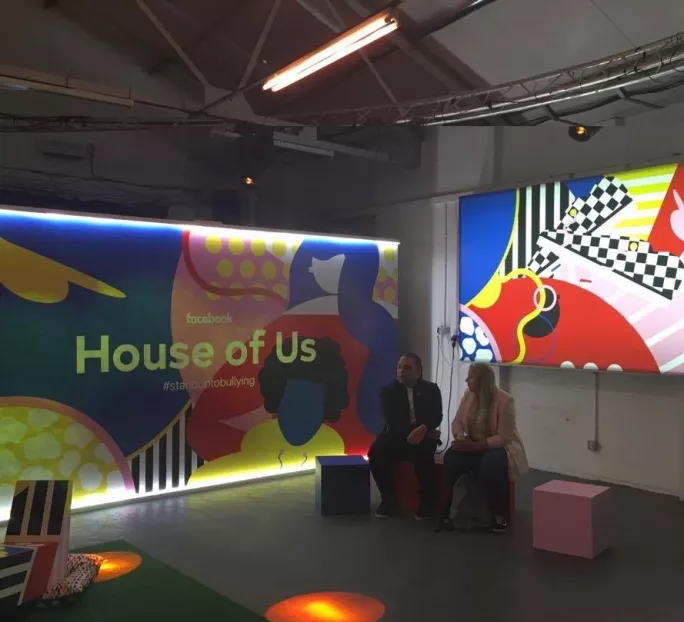- Home
- Disco lights, bants and cat videos: Facebook confronts pupil cyberbullying
Disco lights, bants and cat videos: Facebook confronts pupil cyberbullying

The personal insults, criticising my appearance, get louder and louder as I struggle to find my way out of the dark labyrinth.
When I reach the exit, I am told to “shake off” my negative feelings. As I move my body, a screen shows my black silhouette morphing into a blend of primary colours that match the warehouse’s interior.
Over the next two days, pupils will walk through this audio maze before stepping into the bright and wacky space in Bermondsey that is home to Facebook’s digital safety event, which young people have helped to create.
The ‘House of Us’ experience has been launched on the day that Facebook committed to funding to train a ‘digital champion’ in every UK secondary school in how to tackle issues like cyberbullying. How much this funding amounts to is a moot point: the social media company is initially reluctant to place a value on the project, although one of its senior executives later tells Tes it is providing £1million over two years (see below).
The social media giant hopes that its partnership with charities Childnet International and The Diana Award will allow thousands of pupils to provide peer-to-peer support in secondary schools.
As music blares out and disco lights whirl, school children huddle around a “bants” and “bullying” wall and discuss which of the experiences could be deemed to be comical or hurtful.
“Sometimes our victims of bullying, or the bullies themselves, feel claustrophobic and anxious. So it gives you a taster of what some people feel,” James Okulaja, a Year 10 pupil from Rainham Mark Grammar School in Kent, says.
James was bullied in school because he was “different”. “Everybody loved to take the mick out of me and bully me,” he says. But when he saw his best friend being bullied, he couldn’t let it lie. “I stood up for her and didn’t just watch it happen. Watching it happen can be as bad as being the bully yourself,” he adds.
He was referred to The Diana Award to train to become an anti-bullying ambassador - and has been doing this for more than a year. “We are really trying to get young people to feel empathy,” he says.
Meanwhile, a group of teenagers cycle together on bikes to power up a screen. If they work together as a team then they will be rewarded with videos - of cats, naturally.
And in the room next door, pupils shout positive words to make the white space get brighter. I decide to give it a go. “Happy!” I shout. “Sunshine! Summer!” And, slightly running out of inspiration: “Positive!” The room duly lights up.
‘Just the beginning’
The launch comes as social media companies are being pressured by the government to sign up to a voluntary code of practice to tackle bullying, intimidating or humiliating online content.
Facebook and Twitter could be made to pay for action to tackle the “undeniable suffering” the internet can cause, culture secretary Karen Bradley recently said.
And last month, Anne Longfield, children’s commissioner for England, criticised social media giants of not doing enough to make children aware of what they are signing up to when they install an app.
Despite the funding announcement from Facebook today, organisations that work with schools to tackle bullying - including those involved in today’s event - say that social media companies could still do more.
“There is always more to be done, particularly when it comes to industry,” Caroline Hurst, education manager of Childnet International, says. “Hopefully this partnership is just the beginning.”
Speaking at the event, Alex Holmes, head of campaigns and development at The Diana Award, calls for other social media companies to work more closely with schools. “I think there is always more room for improvement across all the social media companies,” she says.
“We have worked with Facebook to create some resources for teachers and we would welcome that from more social media companies.”
Teachers will be involved in the peer-to-peer schemes in schools. As part of the programme, more than 2,000 school staff will be able to receive training on bullying.
“They have a crucial part because this anti-bullying ambassador programme is about young people, but it cannot be successful without that member of staff,” Mr Holmes says.
“We recognise that there is a crucial need to upskill them in some of the technology that young people are using. So part of our training is dedicated to allowing just that,” he adds.
Teachers can find out more information about registering pupils to become Digital Leaders here or Anti-Bullying Ambassadors here.

Q&A with Antigone Davis - Facebook’s head of global safety policy
1. Why is Facebook doing this work with schools now?
We have been working with Childnet International and The Diana Award for a long time - seven to 10 years - and we really wanted to elevate the relationship and the programmes and ensure that we could offer what are evidence-based programmes in all UK secondary schools.
I think it was the natural extension of the work that we’ve been doing. We know it is work that really matters and works well. We also know from research that three out of four kids would prefer to work with a peer when addressing these issues so we wanted to expand these programmes.
2. There are a lot of reports of young kids using social media, and the dangers they can face. Is there a reason why you chose to focus only on secondary schools?
One of the things that we have done to address the issue of kids at a younger age is we have recently launched a parent portal that basically gives parents tips on how to talk to their kids about online safety. And one of the tips is to engage with them before the age of 13 so they have the skills when they do go onto the platform page to really begin to realise how to use it safely.
3. How much money is going into the scheme?
We have been working with both these organisations for many months now to figure out what it would take to scale this up to ensure we get [a digital ambassador] into every secondary school. And they came back with a figure of over a million pounds [over the next two years].
4. Teachers already have a lot to cope with so will they be given support in this scheme?
They are. The charities do work with the schools as well.
5. There have been concerns raised about social media companies having “impenetrable” terms and conditions and of kids not realising what they’re signing up for when they go onto these social media sites. Is this something you think Facebook could do more on?
I think one of the great things about a programme like this is this actually part of the programme. It is about talking to parents about all these topics that you have just mentioned.
6. Do you support the proposal of a levy on social media companies to tackle bullying?
Fundamental to that proposal is an understandable concern of are companies doing enough? Are they investing enough? We are highly invested in the safety of our platform and I think today is evidence of how seriously we take our responsibilities.
Want to keep up with the latest education news and opinion? Follow Tes on Twitter and Instagram, and like Tes on Facebook
Keep reading for just £1 per month
You've reached your limit of free articles this month. Subscribe for £1 per month for three months and get:
- Unlimited access to all Tes magazine content
- Exclusive subscriber-only stories
- Award-winning email newsletters



